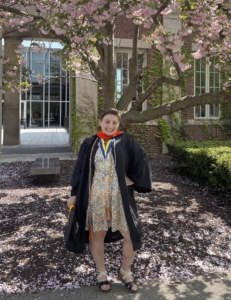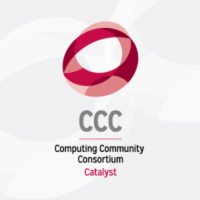Enhancing Online Communication for People With Parkinson’s With Assistive Video Filters
By Yasra Chandio (CRA-E Fellow, University of Massachusetts Amherst) and Alejandro Velasco Dimate (CRA-E Fellow, College of William & Mary)
This Q&A highlight features Adira Blumenthal, an Honorable Mention in the 2023 CRA Outstanding Undergraduate Researchers award program. Adira finished her BS at the University of Rochester and is now pursuing a Take 5 Program in ASL and Accessibility Studies: Exploring Disabled Identity, History, and Culture.
 What led you to computing research?
What led you to computing research?
I always knew that my area of interest in computer science was assistive technology. I needed to explore beyond the standard curriculum to delve into this truly. In choosing a college, I prioritized institutions with a strong emphasis on human-computer interaction, especially around accessibility. The University of Rochester’s HCI Lab, co-led by Prof. Ehsan Hoque and Prof. Zhen Bai, particularly caught my attention due to its focus on assistive technologies. After meeting Prof. Hoque during a campus visit, I was determined to join the lab upon enrollment.
How did you discover the research opportunity?
As a freshman in spring 2020, the shift to online due to COVID-19 presented an opportunity. After receiving an invitation from the Women and Minorities in Computing club to attend online HCI Lab meetings, I actively participated for a few months and afterward joined a project analyzing college students’ online behavior during the pandemic’s onset and its relation to their mental health.
How did you identify and shape your research project?
My active engagement in lab meetings caught the attention of graduate student Kurtis Haut. Noting my insights on accessibility and its ethical aspects, Kurt approached me to discuss a potential project. He initially suggested exploring Parkinson’s patients’ perceptions of a video filter to conceal tremors. Together, we expanded this to encompass voice and appearance-modifying filters, leading to a comprehensive exploration of the ethical facets of such tools, the core of assistive technologies, and the necessity of incorporating feedback from the impacted community, particularly those with Parkinson’s disease.
Can you tell us about your project?
Parkinson’s disease is the fastest-growing neurological condition with no cure, impacting mobility and communication, leading to social isolation and stigma, especially for working individuals. About 40% of people with Parkinson’s have clinical depression. Our research aimed to determine if new video and voice filters could alleviate communication challenges. We surveyed people with Parkinson’s disease and the general public and interviewed Parkinson’s patients and healthcare professionals familiar with the disease. Most participants saw the degradation of communication as a major loss. Our results suggest a strong potential for these filters as assistive technology, particularly prioritizing voice filters to enhance communication. I presented our paper at ACII and was shortlisted for the top three best paper awards.
What challenges did you encounter when first getting started in research?
I was fortunate to start my research smoothly, having proactively built connections. During my school tour, I connected with a professor who co-led the lab I was interested in and kept in touch with him after I started my first semester. I took advantage of the opportunities that came my way and participated in lab meetings, so I had an opportunity to get noticed by other lab members. By actively participating in lab meetings, I became recognizable. However, eager involvement led me to overcommit — juggling two research projects, coursework, and a leadership role in a student organization. Eventually, I had to scale back, focusing on what was most essential, but I retained valuable connections.
How did team dynamics and diverse backgrounds shape your research challenges?
Our team grappled with communication, especially since some members, including me, were newcomers to research. Navigating team dynamics and understanding roles proved challenging. Differences in backgrounds and perspectives on disability and chronic illness required us to emphasize collective education. Given our direct interactions with study participants, ensuring no offense was caused was crucial.
How did you balance your research activities with your coursework?
Outside of research, I was in a student-run musical theater group on campus. When research demands increased, I reduced my theater commitments, and vice versa. I valued theater as my non-academic outlet and strived for the right balance. The skills I acquired from the arts helped me in the research environment.
Do you have any advice for other students looking to get into research?
Start by searching for labs in your university and nearby ones that match your interests and reach out. Once in a lab meeting, actively participate and ask vital questions about the research project, such as the purpose and impact of the research. If the answers do not align with your expectations and values, reconsider your approach. Communicate your needs to the project lead and set time boundaries. If juggling research, coursework, and other activities becomes overwhelming, do not hesitate to discuss adjustments or breaks with your project lead. Try to identify your goals, discuss them with your project lead, and check in with yourself and your team lead to ensure you are aligned on the path forward.









